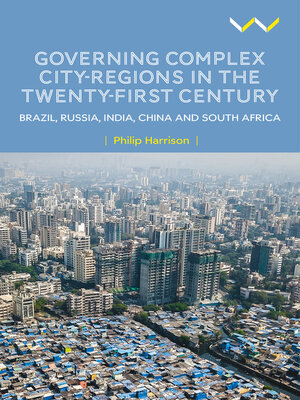Governing Complex City-Regions in the Twenty-First Century
ebook ∣ Brazil, Russia, India, China, and South Africa
By Philip Harrison

Sign up to save your library
With an OverDrive account, you can save your favorite libraries for at-a-glance information about availability. Find out more about OverDrive accounts.
Find this title in Libby, the library reading app by OverDrive.



Search for a digital library with this title
Title found at these libraries:
| Library Name | Distance |
|---|---|
| Loading... |
The scale, complexity and pace of urban change in the recent past has been disorienting. As individual cities evolve into complex urban agglomerations, sometimes called city-regions, urban scholars battle to find adequate vocabularies for contemporary urban processes while practitioners continually search for meaningful governance responses. Governing Complex City-Regions in the Twenty-First Century explores the ongoing evolution of regional and metropolitan governance as diverse urban agents grapple with the dilemmas of collective action across multi-layered and fragmented institutions, in contexts where there are manifold centres of influence and decision-making.
The author draws on the experiences of the BRICS countries (Brazil, Russia, India, China and South Africa), situating his analysis against the particular historical and political cycles of each. This expands the geography of knowledge in the study of city-region governance, revealing meanings, processes and outcomes of city-region governance that are not apparent in the more settled urban contexts of Western Europe and North America on which much of the existing literature is founded.
Intended for students, academics, and professionals, the book provides a critique of the 'best practice' approach, showing that governance approaches are rarely designed but emerge, rather, from the disparate intentions, actions and practices of multiple collaborating and competing actors working within diverse contexts of political settlement and political culture. While it does not offer packaged solutions or easy answers to the challenges of urban governance, it does show the value of comparative study in inspiring new thought and perspectives, which could lead to improved governance practice within South African contexts.
The scale and pace of urban change in the recent past has been disorienting. As individual cities evolve into complex urban agglomerations, scholars battle to find adequate vocabularies for contemporary urban processes while practitioners search for meaningful governance responses. Governing Complex City-Regions in the Twenty-first Century explores the ongoing evolution of metropolitan governance as diverse urban agents grapple with the dilemmas of collective action across multi-layered and fragmented institutions, in contexts where there are also manifold centres of influence and decision-making.
Whereas much of the existing literature is founded on the settled urban contexts of Western Europe and North America this book draws on the experiences of the BRICS countries (Brazil, Russia, India, China and South Africa). The author shows that governance approaches are rarely designed but emerge, rather, from the disparate intentions, actions and practices of multiple collaborating and competing actors working within diverse contexts of political settlement and political culture. Intended for students, academics and professionals, the book does not offer packaged solutions or easy answers to the challenges of urban governance, but it does show the value of comparative study in inspiring new thought and perspectives, which could lead to improved governance practice within South African contexts.







